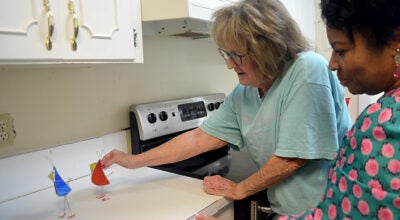U.S. Ambassador visits university
Published 12:00 am Thursday, October 15, 2009
Former United States Ambassador to Jamaica J. Gary Cooper was on hand Wednesday at Troy University to speak to Troy students and faculty.
Cooper spoke about the current foreign policy issues facing America as it relates to dealing with the Caribbean.
“As a nation, we owe it to ourselves to look at this region and develop a strategy and see what we can do to develop industry in the region, and help the people down there,” Cooper said.
Cooper’s lecture was part of the Troy’s ambassador-in-residence program, which is now in its second year.
The decision to bring Cooper in for the program was an easy one, as this year’s program chose to focus on the Caribbean.
“This year, we are focusing on a particular portion of the world,” said Dr. James Rinehart, associate dean of arts and sciences. “This portion of the world may be the most important to American foreign policy. It’s a region that isn’t very familiar to most American lay people. This region is the Caribbean basin, and it helps to form the southern boundary of the United States. “
Cooper spoke about many of the challenges that are currently facing the region, including poverty, drugs, crime political corruption and instability, HIV/AIDS, terrorism, border and territorial disputes and natural disasters.
One of the threats that Cooper spoke extensively about was the current drug trafficking problem in the Caribbean.
“The Caribbean has become a primary transshipment point for drugs,” Cooper said. “These drugs end up in the United States and other places. There is absolutely nothing to indicate the flow is slowing. If anything, the problem is getting worse.”
Cooper offered his ideas on how to curb the problem, but said the issue rests more with the demand for drugs than the supply.
“Surely, we’ve got to increase enforcement,” Cooper said.” But, let’s not kid ourselves. As long as there is a demand, there will be a drug market.”
The Caribbean also faces terrible poverty issues, something Cooper said people in the United States are not truly aware of.
“Such poverty exists you would not believe,” Cooper said. “The minimum wage in Jamaica, and many other countries in the Caribbean is less than $50 a week, with prices in grocery stores being the same as they are in New York City.”
Cooper also spoke about the Caribbean’s struggles with crime rate.
“Last year, over 1,500 convicted criminals who had finished serving sentences in the United States were deported back to the Caribbean to countries that do not have parole systems,” Cooper said. “So, they were just released back into communities.”
However, the issues involving crime and poverty that are currently facing the Caribbean often overlap, according to Cooper.
“Countries where you have high employment and good activities for children, you’ve got low crime,” Cooper said. “But, even here in our own cities, when you have high unemployment, there’s going to be a high crime rate. You just have to try and make some economic and societal changes.”




